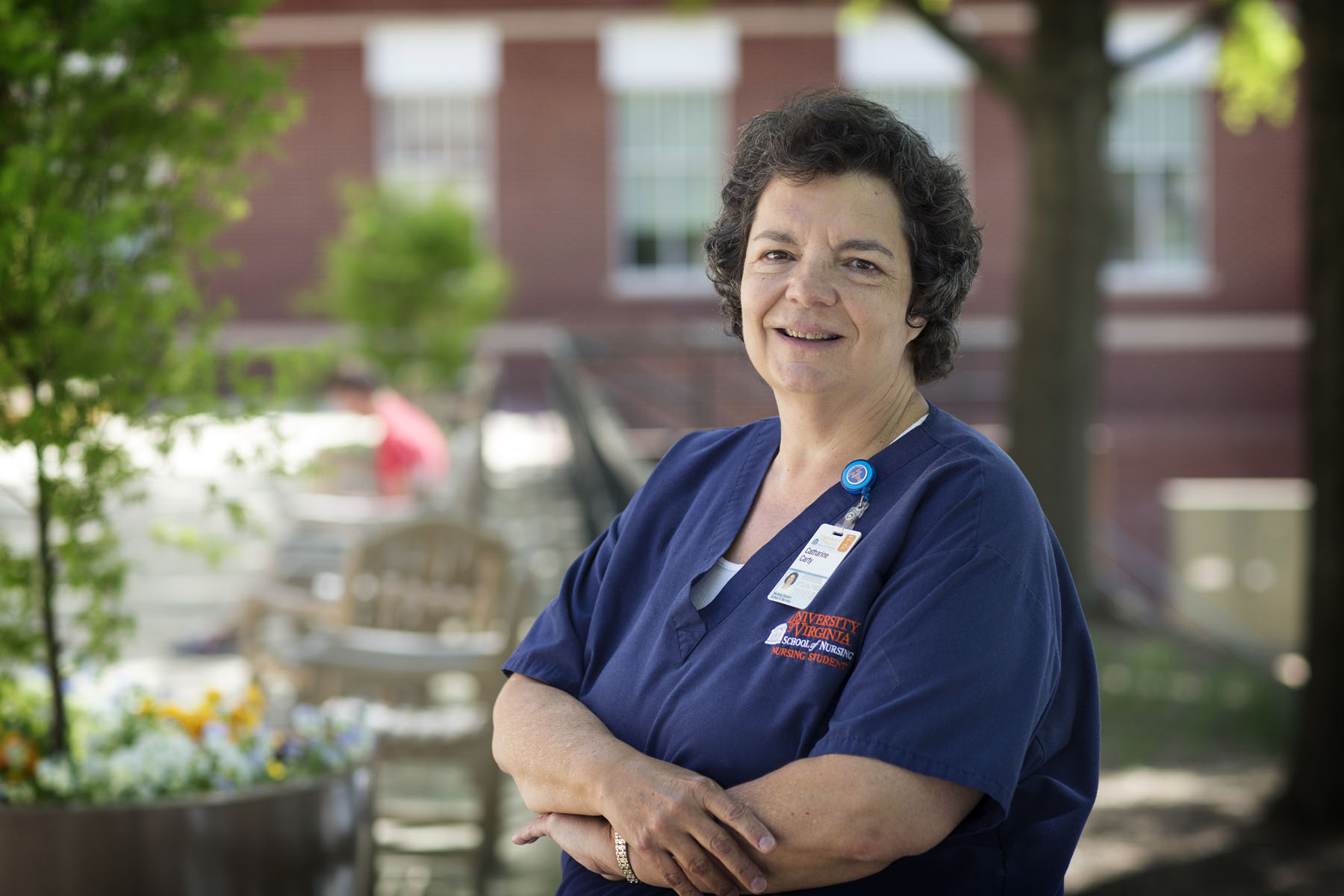University of Virginia nursing student Catharine Carty is used to working side-by-side with men.
“In the early days, it was always me and a bunch of guys,” laughed Carty, who will earn a second master’s degree from U.Va. this May, this time in nursing. “Though it’s changed now, when I began in engineering it certainly was a man’s profession. Nursing, I think, is beginning to make a similar transition.”
After earning her undergraduate degree in math from Randolph-Macon College in the early 1970s, Carty enrolled in the School of Engineering and Applied Science’s master’s program during that school’s campaign to attract more women into its ranks, earning a degree in systems engineering in 1977. From there, she launched a successful career in supply chain management at some of the world’s biggest corporations, including Mars, TRW, Westinghouse and, most recently, Denver-based Molson Coors.
Thirty-five years later, she retired from engineering, knowing she’d reached the beginning of her life’s part B. For her, that meant a pivot into health care.
“This is my ‘give back,’” she said, “and nursing seemed like the right thing.”
During her two years in the Clinical Nurse Leader program – the only master’s entry program in Virginia that enables students with at least a bachelor’s degree in another field to enter the nursing profession on a fast track – Carty says she’d jump at the chance to do anything patient-related. She cites her interest in developing relationships with patients and their families as the most attractive part of the job, and hopes, shortly, to find a gig as a bedside nurse.
“Mental health, geriatrics, labor and delivery – I’m all in,” Carty said.
The Clinical Nurse Leader program, founded in 2005, offers non-nurses an ability to pivot into the profession through a full-time, two-year program. Its graduates fill a unique need, given the national shortage of professional nurses and nursing faculty, and speak directly to the Institute of Medicine’s 2010 mandate to populate the health care world with more competent, compassionate nurses with the leadership skills associated with an advanced degree.
In short, the program appears as if it were meant for Carty.
“Catharine’s someone who really brings it all together,” said nursing professor Gina DeGennaro, who coordinates the program. “She’s got all the interpersonal skills, is an outstanding student, and is appreciative for the education she’d gotten here. And all that’s coupled with a strong desire to give back. This is her opportunity to change the world, and she’s looking forward to it.”
Despite her lengthy experience in engineering and technology, Carty is no stranger to health care. A hospice volunteer who also volunteered with troubled teens and taught, she says she’s drawn to geriatric populations that she met during her clinical rotations in nursing school. The elderly “have great stories, and they’ve earned the right to be how they are,” she said.
“Some people don’t feel comfortable with the dying,” she admitted, noting her particular passion for hospice care, “but to me, it’s a special time and really it’s all about the quality of life at the end. I see my role as helping with that.”
Though she hadn’t anticipated that her career as an engineer would inform her practice as a nurse, Carty’s found that it’s so.
“Every career is about people,” she said, “and I’ve led people for 35 years. I figured I’d be leaving my whole past behind, to be the nurse at the bedside, and had figured I’d divorce myself from engineering, but maybe my past experiences with processes and systems means I might have more to offer. Health care certainly needs a lot of work on its processes, systems and technologies – and that’s what I do.”
If Carty’s husband, Jim, was initially bewildered by her choices, both he and their two children told her, “I don’t understand why, but we’re all behind you.” She hopes her nursing career enables her to both work professionally and later, as a volunteer in a hospital, at a free clinic, or in home care. Moving into nursing, she said, has fulfilled a dream.
“My friends all said I was crazy,” she said. “‘Why would you leave a successful career to start again? Why invest all this time and effort in nursing school to end up with this really hard, if rewarding job?’”
In the end, it was a calling, she said.
“It was time to give back,” she said, noting that she will walk the Lawn for the first time May 19, making up for not having done so back in 1977. “There are things you do because you have to. I felt like I needed to do this, and had resisted as long as I could. Nursing chose me.”
Media Contact
Article Information
May 15, 2013
/content/class-2013-brewery-engineer-turned-nurse-pivots-beer-bedside

